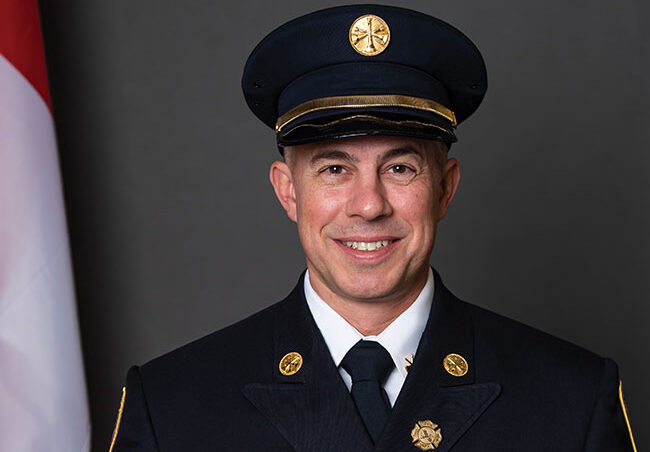
Features
Leadership
Applying Darwin’s principles: Diversity and adaptation in Fire
August 18, 2023
By Matt Furlot
 Assistant Chief Matt Furlot
Assistant Chief Matt Furlot Renowned evolutionary biologist Charles Darwin famously posited that the key to the success of a species lies in its ability to diversify and adapt to its ever-changing surroundings. Have you ever considered how this principle could apply to the fire service? Imagine a fire department that prioritizes diversity and adaptability in its operations. What kind of positive impact could this have on the community it serves?
A diverse fire department can represent the community it serves and respond to a wide range of challenges. This means hiring from diverse backgrounds, ethnicities, and genders, and addressing the barriers that prevent minorities from joining the service. A diverse fire department brings a wide range of perspectives, experiences, and skills to the table, enabling the department to approach problems from multiple angles and find creative solutions. It’s like having a toolbox filled with different tools and you never know which one you’ll need until you’re in the middle of a crisis. With a diverse team, you have a better chance of finding the right solution quickly.
Diversity builds trust in the community. When firefighters come from a range of backgrounds, ethnicities, and genders, and have different experiences, they are better able to represent the communities they serve and adapt to changing circumstances. This helps to establish rapport and trust between the fire department and the community. This trust can help to facilitate open communication and collaboration, enabling the department to better understand the needs of the community and develop more effective solutions. Diversity helps build a more resilient fire department.
The fire service’s ability to adapt is crucial for responding to new challenges. As we live in the fastest-changing time in human history, with technology and global climate change as two of the biggest contributing factors, the fire service must identify and respond to new challenges continually (Steffen et al., 2015).
Adapting its culture is an essential area for the fire service. While change may be uncomfortable, it is necessary to progress. As the world changes rapidly, new approaches to problem-solving must be explored, such as dealing with the challenges posed by electric vehicle fires and needed deviations from the standard approach. In addition to cultural changes, the fire service must also adapt to changes in the global climate.
This involves responding to an increasing number of wildfires and developing prevention strategies to mitigate the risk of extreme weather. FireSmart programs have been created to help communities reduce their risk of wildfires, and the fire service must be able to adapt to these new approaches.
Furthermore, the fire service must continually adapt to new technologies by investing in new equipment, training firefighters and developing new approaches to responding to emergencies. So, how can upper leadership in the fire service help to foster diversity and encourage adaptation? It starts with understanding the need for diversity and adaptability and prioritizing these principles in their decision-making and leadership styles.
Leaders must be able to anticipate changes and be willing to adapt, even if it means making difficult decisions. They must be proactive, not reactive, and must have the ability to think critically and creatively to find solutions to complex challenges. Upper leadership must also be willing to foster a culture of innovation and experimentation, where new ideas are welcomed and tested. It also means being willing to take calculated risks and to learn from failures.
Applying Darwin’s principle of diversity and adaptation to the fire service is not just about survival, it’s about thriving. By prioritizing diversity and adaptation, fire departments can ensure that they remain effective, efficient, and responsive to the needs of their communities.
Resisting change will stagnate an organization, while being open to new solutions and continual adaptation will see an organization thrive. As Darwin himself said, “It is not the strongest of the species that survives, nor the most intelligent. It is the one that is most adaptable to change.”
References
- Darwin, C. (1859). On the Origin of Species by Means of Natural Selection, or the Preservation of Favoured Races in the Struggle for Life.
- Steffen, W., Broadgate, W., Deutsch, L., Gaffney, O., & Ludwig, C. (2015). The Great Acceleration and the Great Divergence: Global Interdependence and the Changing Structure of the Biosphere, 1960–2010. Anthropocene Review, 2(1), 81-98. doi: 10.1177/2053019614564785
Assistant Chief Matt Furlot has been in the fire service for 21 years serving the community of West Vancouver. He has been the divisional chief of training for the department for four years. Matt has a background in health sciences, has completed his NFPA 1021 Fire Officer IV, and serves on several fire service leadership committees both regionally and nationally. Contact him at mattfurlot@gmail.com.
Print this page
Advertisement
- Fire fighting camp ignites opportunities for young women in Sudbury
- Ottawa could do more to equip volunteer crews to fight wildfires: firefighter association president